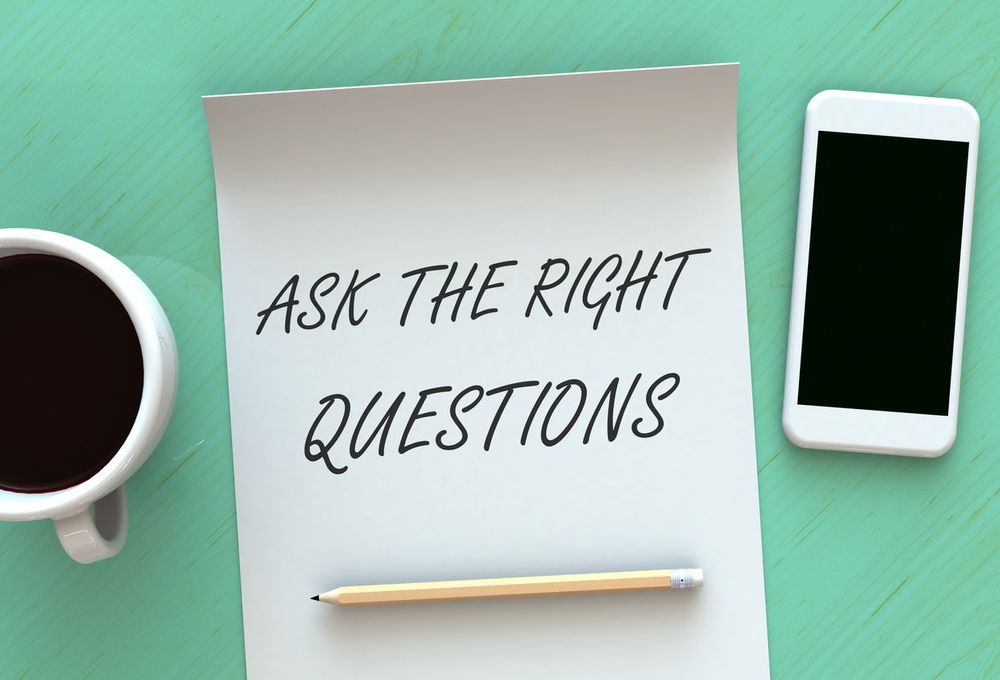
Most people prepare themselves for the questions they will need to answer during a job interview. However, it's not only answering questions you need to be ready for. You should also prepare yourself to ask the right questions. Before you go into a job interview, be ready to ask questions that enhance the way in which the interviewer looks at you.
You probably know why the answers to interview questions matter. But why do your questions matter? Although an interviewer can tell a lot about you from your answers, they can also find out a great deal about you from your questions.
Typically, people who go in for job interviews don't prepare themselves with questions. When the interviewer asks if they have any questions, a candidate might sit there with a blank stare. Or, they may fire off a list of common questions and not listen to the answers.
In either case, the hiring manager won't be impressed. You can use your questions as a way to stand out from other applicants. With your questions, you can showcase how qualified you are for a position. The right questions make it clear that you can back up what you put on your resume.
Asking questions also displays your confidence. It makes the hiring manager realize that you're not desperate and that you're confident enough to take the initiative. Employers prefer hiring confident people who don't avoid speaking up.
When people don't ask questions during job interviews, they come across as disinterested. You make it seem as if you don't care enough about the job or see yourself working with the company for any length of time. By asking questions, you show that you take the job seriously and have thought about the future.
Many job applicants go through interviews without caring whether or not they get a job offer. The right questions make it clear that you truly care about the job and are likely to accept a job offer.
No one should ever accept a job offer blindly. To make sure you know everything you should about an employer, ask questions during your interview. You might discover something that makes the position unappealing or find out that it's the job of your dreams.
The right questions also prepare you for potential challenges. If you learn that it's difficult to meet a certain milestone, you can be ready for the challenge. You may learn of some ways in which you can overcome the obstacles and succeed.
Under some circumstances, you can use your questions to show that you think creatively. For instance, you might ask about a cutting-edge technology or ask if they've tried a new technique. This is a good opportunity to display your interest and creativity.
Today, more than ever, employers appreciate people who think outside of the box. With the right questions, you can show that you won't accept things; you show that you want to improve them.
Perhaps the most important benefit of asking questions is making a strong impression. After interviewing 30 people for a job, a hiring manager loses sight of each individual. But your questions could make you more memorable than the other applicants. It gives you a much-needed edge over the competition.
Here are some of the questions you should consider asking during the interview. You don't need to and shouldn't ask all of these questions. Instead, pick and choose which questions are most applicable to the job and your wants.
What are the company's most cherished values, and how can my work further these values?
What are the most and least desirable aspects of the company culture?
How do you define or measure success in the workplace?
What processes do you use to facilitate a collaborative working environment?
What are some areas of weakness in the team?
What would you like to see me accomplish in the first 60 days of employment?
How long have you been an employee here?
What makes you so successful in your position?
What's the average employment period of your employees?
Where do you see the company in five years?
Will I have a mentor, or will I have the opportunity to be a mentor?
How do you measure employee success?
How could I meet or surpass your expectations in six months?
Do you have any concerns about my qualifications or skills?
What happens next in the hiring process?
When should I expect to hear from you?
What's the expected start date for the new employee?
Who should I reach out to if I have any other questions?
All of these questions need a little polishing, as well as a personal touch. Remember, you're not interrogating the hiring manager. You simply want to ask your questions, wait for an answer, and then continue the pattern until you're satisfied.
While you should practice these questions, you don't want to sound rehearsed. If you are robotic or unemotional, the hiring manager won't care that you took the time to ask questions. You need to make an effort to sound genuine and interested.
An interview is an essential part of the hiring process. If you don't take the time to prepare yourself for the interview, you probably won't be successful. Just as you would put effort into your job, you need to put effort into preparing for the interview.
This means picking out an appropriate interview outfit, practicing answers to common interview questions, and knowing which questions you want to ask. For the best results, you may want to ask a friend to host a mock interview. On the day of the actual interview, you will have a better idea of what to expect.
By preparing for your interview, you give yourself a much better chance of success. The effort you put into will eventually pay off with a job offer.
Lorem Ipsum is simply dummy text of the printing and typesetting industry. Lorem Ipsum has been.
